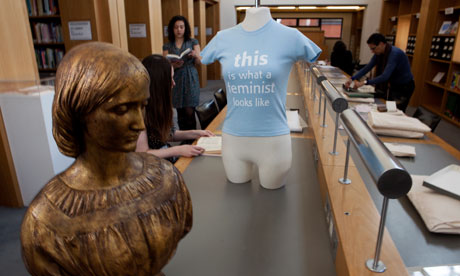
There will be women of a certain age all over Britain who will have been thinking: one of these days I'll get at those boxes in the loft, in the basement, under the bed, in the shed, and get them to the Women's Library.
Their archives hold unwritten histories of one of the most paradoxically influential and yet unresourced movements of the 20th century. They are full of personal notes on political tumult, minutes, pamphlets, conversations and encounters with life-changing ideas.
It is ironic that at the very moment when there is an embryonic renaissance of feminism, the archives of the women's liberation movement are at risk of losing their final destination, if London Metropolitan University unloads its responsibility for the Women's Library. It is a damned shame that the current custodian sees it not as a national treasure, but as a burden; not as a resource to be enriched, but as an administrative problem.
The Women's Library houses a historical archive that is recognised among historians to be unique. And it is also a living library, a place where "history" gets made – collecting and curating the bits and pieces of the everyday life of movements that have no other home. Women's movements and women's stories are not warehoused in the nation's great archives. Hansard doesn't record their life and times.
Laura Schwartz is a research fellow who spends her days at the Women's Library, quarrying its unique resources for her study of servants' trade unions. Despite the liberation of technology, she reminds us that less than 1% of 19th century journals are digitised. People still need access to original sources and records, and there is nothing like seeing and feeling the texts and fabrics of another time. She has become active in the campaign to save the library and insists that it's not just the archive and its integrity that needs to be defended, but also the place and the people who work there.
The award-winning building and its staff are located near Brick Lane, and like the archive, is in the midst of the most ethnically diverse and economically underprivileged populations. London Met may not be famous, but the Women's Library is.
"It is one of the very few research libraries that have open shelves," says Schwarz, "you can browse; obscure publications sit side by side with more established material – you can make unexpected connections."
Prof Catherine Hall's students from University College London use the library. Her work focuses on race and empire, but she recently found boxes of women's liberation documents in her basement and donated them to the Women's Library. They came from Birmingham in the 70s, and documented the 20-30 women's liberation groups active in that city alone: "we were involved in all sorts of things, from consciousness-raising, to children, to violence, running rape crisis centres – pretty impressive, really. The ephemera captures the life of a movement." Her boxes illuminate the life of the movement and also the city where it flourished and whose institutions and culture it changed.
The replenishing of the archives is vital, says Prof Barbara Taylor, whose book Eve and the New Jerusalem was an emblematic text of feminist research in the 1980s. "The Women's Library has treasures. It is supreme." Not least because it has collections that enable people to see how "once women's rights are on the agenda, once the gratuitousness of women's secondary position becomes obvious, you have continuous movements; it is only the tempo and focus that changes. In women's liberation we thought were making it up," she recalls. "What we didn't realise was what we were building on."
That's why the archive is so important – "lose it and that's when women really do become hidden from history". Ideas and connections are torn from their contexts; and contemporary debates lose their meaning.
Well, women's history deserves investment. Our archives, our ephemera and memorabilia need more than a warehouse, they need the labour-instensive collecting and curating that makes connections, that makes sense of stuff.
It is an eerie thing – to become part of history. Like many women of my time, I assumed that my bits and pieces would be going to the Women's Library – not because I'm important, but because it was. It is. Because it's worth it.
• Follow Comment is free on Twitter @commentisfree

